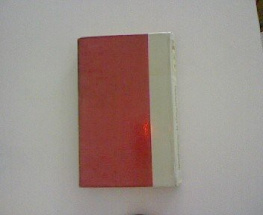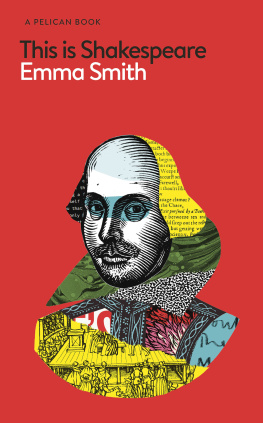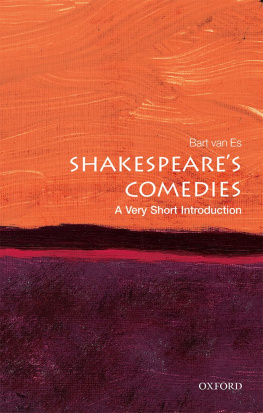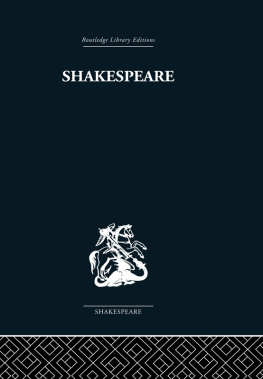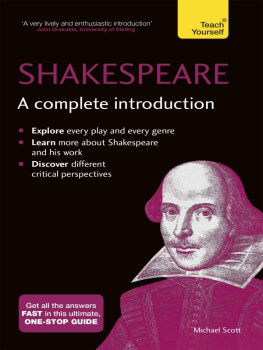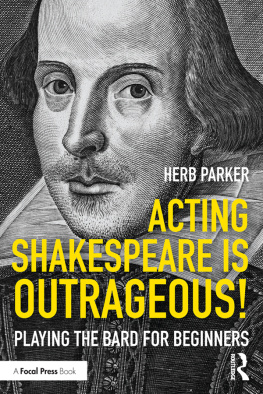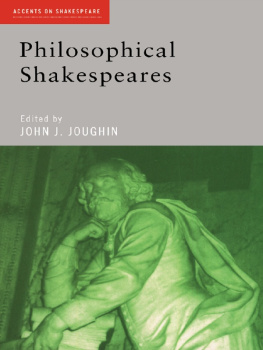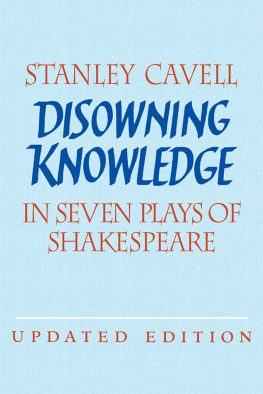Ernest Schanzer - Problem Plays of Shakespeare
Here you can read online Ernest Schanzer - Problem Plays of Shakespeare full text of the book (entire story) in english for free. Download pdf and epub, get meaning, cover and reviews about this ebook. year: 1963, publisher: Routledge & Kegan Paul PLC, genre: Science. Description of the work, (preface) as well as reviews are available. Best literature library LitArk.com created for fans of good reading and offers a wide selection of genres:
Romance novel
Science fiction
Adventure
Detective
Science
History
Home and family
Prose
Art
Politics
Computer
Non-fiction
Religion
Business
Children
Humor
Choose a favorite category and find really read worthwhile books. Enjoy immersion in the world of imagination, feel the emotions of the characters or learn something new for yourself, make an fascinating discovery.
- Book:Problem Plays of Shakespeare
- Author:
- Publisher:Routledge & Kegan Paul PLC
- Genre:
- Year:1963
- Rating:5 / 5
- Favourites:Add to favourites
- Your mark:
- 100
- 1
- 2
- 3
- 4
- 5
Problem Plays of Shakespeare: summary, description and annotation
We offer to read an annotation, description, summary or preface (depends on what the author of the book "Problem Plays of Shakespeare" wrote himself). If you haven't found the necessary information about the book — write in the comments, we will try to find it.
Problem Plays of Shakespeare — read online for free the complete book (whole text) full work
Below is the text of the book, divided by pages. System saving the place of the last page read, allows you to conveniently read the book "Problem Plays of Shakespeare" online for free, without having to search again every time where you left off. Put a bookmark, and you can go to the page where you finished reading at any time.
Font size:
Interval:
Bookmark:
A Study of Julius Caesar, Measure for Measure, Antony and Cleopatra
by ERNEST SCHANZER
SCHOCKEN BOOKS NEW YORK
-iii-
First SCHOCKEN PAPERBACK edition 1965
Copyright 1963 by Ernest Schanzer
Library of Congress Catalog Card No. 63-9752
Manufactured in the United States of America
-iv-
TO THE MEMORY OF MY PARENTS
-v-
|
|
|
THIS BOOK has been written out of a feeling of acute dissatisfaction--which I share with many students of Shakespeare --with the common grouping together of All's Well, Measure for Measure, Troilus and Cressida, and sometimes Hamlet, as Shakespeare's Problem Plays. It seeks to define the term 'problem play' more narrowly and precisely than has been done in the past and to apply it to a largely different group of plays, which it seems to fit more adequately. Measure for Measure remains, but to it are added Julius Caesar and Antony and Cleopatra, to which the term has not, to my knowledge, been previously applied.
Each of the three plays is discussed in a separate chapter, which has been written in such a way that it can be read and understood by itself, without knowledge of the chapters that precede it.
With each of the plays I have discussed all those elements which seemed to me of importance and about which I felt I had something new and not irrelevant to say. The 'problem play' aspect is only one of these elements, and by no means always the one to which I have given most space.
I am most grateful to a number of scholars, who have read one or all of the chapters in manuscript, and from whose advice and criticism I have profited: Professor Adrien Bonjour, Dr. Hermann Fischer, Mrs. Shelagh Hunter, Dr. J. W. Lever, Mr. J. C. Maxwell, Mr. Brian Morris, Professor Kenneth Muir, Dr. F. W. Sternfeld, and, above all, Miss Inga-Stina Ekeblad (Mrs. R. Ewbank), and Dr. G. K. Hunter.
My specific obligations to works of Shakespeare criticism I have tried to acknowledge as fully as possible in the course of the discussion.
-ix-
All Shakespeare quotations follow the text of the Tudor Shakespeare ( 1951), edited by Peter Alexander.
Parts of the chapter on Julius Caesar have appeared in ELH ( 1955), in Shakespeare Quarterly ( 1955), in uvres Compltes de Shakespeare, vol. 4 ( 1958), and in the Introduction to Shakespeare's Appian ( 1956); and parts of the chapter on Measure for Measure in uvres Compltes de Shakespeare, vol. 5 ( 1959), and in Shakespeare Survey ( 1960). I wish to thank those responsible for permission to reprint this material in a revised form.
E. S.
-x-
IT SEEMS that the first to have thought of grouping together All's Well, Measure for Measure, Troilus and Cressida, and Hamlet, and of calling them ' Shakespeare's Problem Plays', was F. S. Boas. In Shakspere and his Predecessors ( 1896) he wrote:
All these dramas introduce us into highly artificial societies, whose civilization is ripe unto rottenness. Amidst such media abnormal conditions of brain and emotion are generated, and intricate cases of conscience demand a solution by unprecedented methods. Thus throughout these plays we move along dim untrodden paths, and at the close our feeling is neither of simple joy nor pain; we are excited, fascinated, perplexed, for the issues raised preclude a completely satisfactory outcome, even when, as in All's Well and Measure for Measure, the complications are outwardly adjusted in the fifth act. In Troilus and Cressida and Hamlet no such partial settlement of difficulties takes place, and we are left to interpret their enigmas as best we may. Dramas so singular in theme and temper cannot be strictly called comedies or tragedies. We may therefore borrow a convenient phrase from the theatre of to-day and class them together as Shakspere's problem-plays.
(p. 345)
It is already implicit in this passage, and his subsequent discussion of each of the four plays makes abundantly clear, that the problems he finds in them are of the most diverse sorts. In All's Well and Measure for Measure they are moral problems: he speaks of their 'perplexing moral entanglements' (p. 409)-though it is difficult to see how this accords with his detailed discussion of the two plays, in which, on the contrary, he insists that the presentation of their moral issues is quite unequivocal and devoid of perplexity. The problem he finds in Hamlet is psychological. Its protagonist 'remains a mystery, eternally
____________________| 1 | For example, he declares that in Measure for Measure Shakespeare deliberately abstained from 'blurring the line between right and wrong' by not depicting Isabel as 'torn by the conflict between sisterly love and her ideal of duty' (p. 366). |
-1-
fascinating, eternally inscrutable' (p. 389). The problem that he sees in Troilus and Cressida, on the other hand, is neither moral nor psychological, but rather one of interpreting so complex a play, above all of discovering the relation of the war-plot to the love-story (p. 370). It presents the reader with a problem in the sense of 'a difficulty' of understanding what Shakespeare was up to. And a further kind of problem which he finds in the four plays is one of classification. 'Dramas so singular in theme and temper cannot be strictly called comedies or tragedies.' But although he gives the most diverse meanings to the term 'problem play', he nowhere gives it the meaning it had in the theatre of his own time, from which he declares to have borrowed this 'convenient phrase': namely, a play dealing with problems confronting not a single and unique individual but contemporary society as a whole, as is the case with some of the drama of Ibsen and the early Shaw.
What chiefly unites the four plays for Boas is 'the atmosphere of obscurity which wraps' them and which 'closes most thickly round Hamlet' (p. 384). And he compares the change from this group to what he calls 'the tragedies in the stricter sense' to 'the passage from a valley swathed in folds of mist into a bare, storm-swept upland' (p. 409). On this upland one is surprised to encounter not only Macbeth and Lear, Othello and Coriolanus, but also the Queen of Egypt, though we are told that 'in Antony and Cleopatra and Coriolanus the dead-weight of historical material hampered the free movement of the tragic spirit' (pp. 409-10).
Although Boas's notion of what constitutes the Shakespearian problem play is, to borrow a convenient phrase from him, 'swathed in folds of mist', although it is undefined and muddled --or, dare one suggest, just because of these qualities--both his grouping and his label found very general acceptance in the decades that followed.
Thirty-five years later W. W. Lawrence published his Shakespeare's Problem Comedies ( 1931). He decided to exclude Hamlet from his discussion and to confine it to the other three plays in Boas's group, largely because he felt that the term 'problem play' is most usefully applied 'to those productions which clearly do not fall into the category of tragedy, and yet are too serious and analytic to fit the commonly accepted conception
Font size:
Interval:
Bookmark:
Similar books «Problem Plays of Shakespeare»
Look at similar books to Problem Plays of Shakespeare. We have selected literature similar in name and meaning in the hope of providing readers with more options to find new, interesting, not yet read works.
Discussion, reviews of the book Problem Plays of Shakespeare and just readers' own opinions. Leave your comments, write what you think about the work, its meaning or the main characters. Specify what exactly you liked and what you didn't like, and why you think so.

